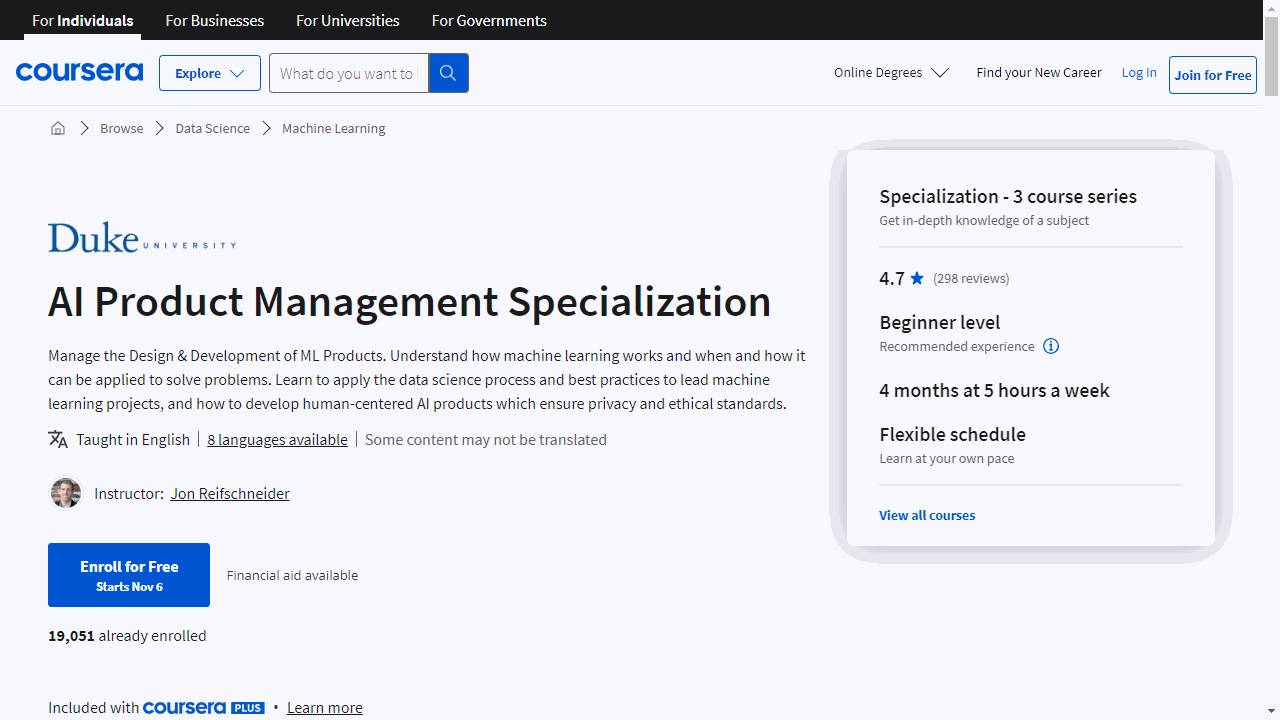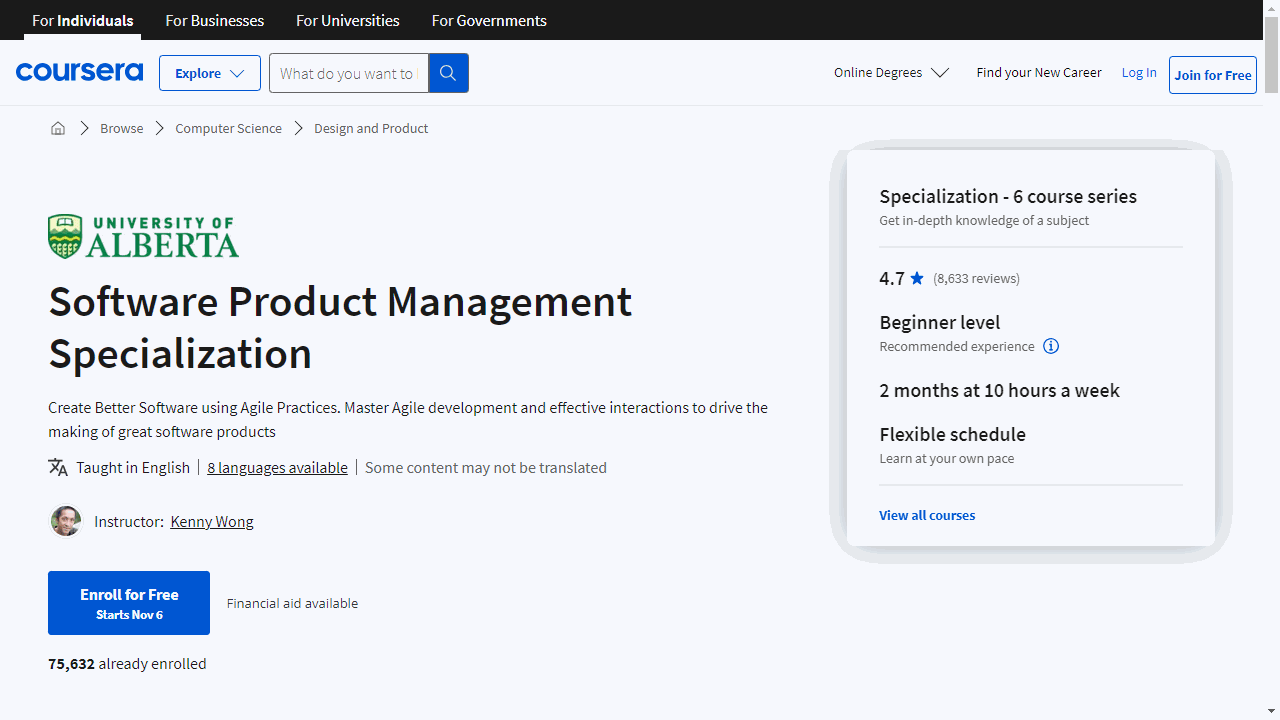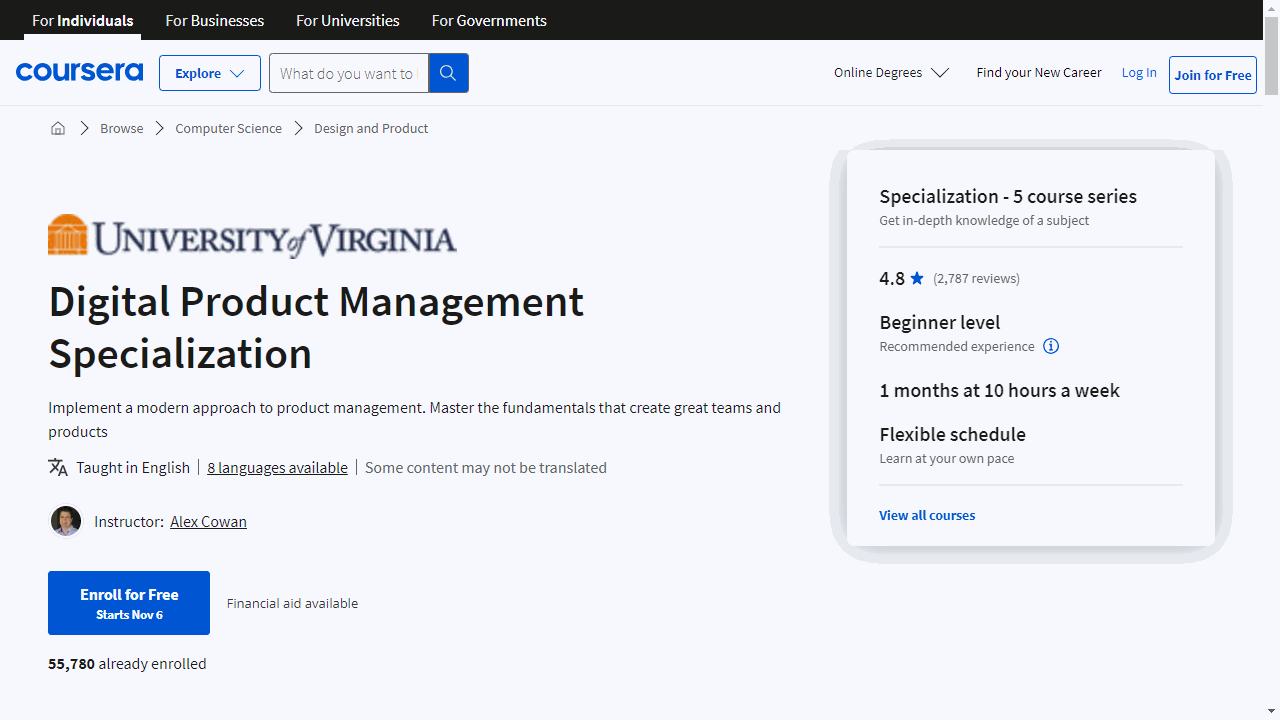Product management is a crucial function in any company that creates and sells products.
Product managers are responsible for the strategy, roadmap, and execution of a product’s lifecycle.
They work with cross-functional teams, including engineering, design, marketing, and sales, to bring new products to market and improve existing ones.
By learning product management, you can gain valuable skills that are applicable to a wide range of industries and roles, from startups to large corporations.
Finding the right product management course can be challenging, with numerous options available online and offline.
You’re looking for a program that covers the core concepts, provides practical experience, and is taught by experienced professionals.
You might also want a course that fits your learning style and schedule, whether you prefer self-paced learning or live instruction.
For the best product management course overall, we recommend the Product Manager Nanodegree offered by Udacity.
This comprehensive program covers the entire product development lifecycle, from ideation to launch and beyond.
You’ll learn from industry experts, gain hands-on experience through real-world projects, and build a portfolio to showcase your skills.
It’s an excellent choice for anyone looking to break into product management or advance their career in the field.
While the Product Manager Nanodegree is our top pick, there are other great options available depending on your specific needs and preferences.
Keep reading to explore our curated list of the best product management courses, including options for beginners, advanced learners, and those interested in specialized areas like AI product management or growth product management.
Product Manager Nanodegree
Provider: Udacity
The Udacity Product Manager Nanodegree equips you with the skills to excel in the tech world.
You’ll gain hands-on experience and learn from Google product managers like Alex King, who worked on Pixel Camera and Google Home, and Anastasia Root, who leads growth for the Google iOS Search app.
The program covers the entire product development lifecycle.
You’ll learn how to identify problems, create a product vision, and communicate it effectively.
The curriculum dives deep into design sprints, teaching you to rapidly prototype and test ideas.
You’ll master the art of influencing without authority, a crucial skill for collaborating with development teams.
You’ll explore various development methodologies and tools, understanding how to manage a product development project from start to finish.
You’ll learn how to prepare for launch, develop marketing strategies, and gather post-launch feedback.
The program concludes by helping you craft a stellar LinkedIn profile and resume, boosting your chances of landing your dream product management role.
Product Management 101
Provider: Udemy
You begin by grasping your purpose as a product manager and understanding how to maximize your impact on your company and products.
The course then delves into market intelligence.
You learn to gather insightful customer data through interviews and analysis, utilizing tools like the Kano model to pinpoint and prioritize customer needs.
The course then guides you through market analysis, teaching you to identify market segments through needs-based segmentation and to effectively analyze your competition.
You then transition into developing product strategy.
You learn to define your product vision and objectives, crafting a roadmap using tools like OKRs and development buckets to track progress.
You’ll then explore new product development approaches like discovery and delivery, stage-gates, and user story mapping, learning how to test product concepts and utilize product analytics for data-driven decisions.
Finally, the course covers product lifecycle management, teaching you how to position and price your products strategically.
You’ll discover how to build strong sales channels, support your sales team, manage product support issues, and navigate product obsolescence.
You’ll work with real-world examples like Ancestry’s DNA testing service and LinkedIn’s pricing model.
AI Product Management Specialization
Provider: Coursera
This specialization from Duke University’s Pratt School of Engineering equips you with the skills to lead and manage AI projects.
You start by mastering the fundamentals of machine learning.
This includes understanding how it works, exploring various types of machine learning, and diving into the process of building, evaluating, and interpreting machine learning models.
You even gain practical experience by training a model on a real-world problem.
The specialization then guides you through the practical aspects of managing machine learning projects.
You learn to pinpoint opportunities where AI can provide solutions and discover how to apply the data science process to structure your projects effectively.
The course prepares you to make crucial technology decisions for your AI system, guiding you through the entire project lifecycle from initial idea to final production.
Finally, you delve into the crucial human element of AI development.
The course teaches you how to design AI products that are user-friendly and ethical, emphasizing the importance of data privacy.
You learn how to identify and address bias in AI systems to ensure fairness and build trust with users.
This deep dive into human-centered design provides a comprehensive understanding of AI’s role in decision-making and equips you to build AI systems that augment human intelligence effectively.
Growth Product Manager Nanodegree
Provider: Udacity
The Udacity Growth Product Manager Nanodegree is a great way to learn the skills you need to be a successful Growth Product Manager.
This three-month program teaches you everything from attracting new customers to keeping them happy.
You discover how to build acquisition funnels, which help guide customers towards buying your product, and identify core customers, which are the customers most likely to become loyal users.
You also learn how to create growth loops.
These loops are systems that bring in new users, convince them to try out the product, and keep them coming back for more.
The Nanodegree doesn’t just stop at theory; it also includes real-world examples from companies like Postmates and Credit Karma.
For example, you might analyze how Postmates uses pricing to attract customers or how Credit Karma keeps users engaged with personalized financial advice.
These examples make the concepts easier to understand and show how they’re used in the real world.
You’ll get hands-on experience through projects based on real-world scenarios.
You might design a pricing strategy for a product, create a plan to improve user engagement, or build a system to track customer behavior.
These projects allow you to put your newly acquired knowledge into practice and build a portfolio that showcases your abilities.
The instructors, including industry veterans like Katherine Wu from Microsoft and Shiv Patel from Motorola and WeWork, guide you through each step.
They share their insights and experiences, providing valuable perspectives on the world of product management.
By the time you finish the Nanodegree, you will have the knowledge, skills, and portfolio to pursue exciting opportunities in the field of Growth Product Management.
Advanced Product Management: Vision, Strategy & Metrics
Provider: Udemy
This Udemy course on advanced product management teaches you how to create a vision for your product and turn that vision into a successful strategy, just like companies like SpaceX and Facebook.
You’ll discover how to break down large projects into smaller, manageable steps using the product development hierarchy.
You will then learn how to use data to make smart decisions about your product.
The course explains different types of metrics, such as leading and lagging indicators, and teaches you how to use them to track your progress.
You’ll also learn how to analyze your data using techniques like cohort analysis.
Finally, the course shows you how to apply these concepts to specific industries.
You’ll learn about the most important metrics for e-commerce, mobile apps, and marketplaces.
The course also includes interviews with experienced product managers, such as Melissa Perri from Produx Labs, who share their insights and advice.
Software Product Management Specialization
Provider: Coursera
This specialization equips you with the essential skills for effective software product management.
You begin by grasping the pivotal role of a software product manager and their contribution to developing high-quality software.
The curriculum delves into various process models for software development, with a particular emphasis on Agile methodologies.
You acquire practical skills in Agile practices, including Scrum and Extreme Programming, understanding how to translate client needs into well-defined software requirements.
You learn techniques like user stories and use cases for effective requirement gathering.
This knowledge is further enhanced as you discover how to transform these requirements into actionable plans, assess potential project risks, and implement velocity-driven planning techniques.
A crucial aspect of the specialization involves understanding how to measure and visualize project progress.
You explore the use of metrics and reviews to monitor software quality and pinpoint areas for improvement.
The course also equips you with valuable skills in applying Lean software development principles and incorporating Agile review practices to enhance project transparency.
Finally, you gain hands-on experience through a capstone project simulating a real-world software development scenario.
AI Product Manager Nanodegree
Provider: Udacity
This one-month program teaches you about artificial intelligence (AI) and machine learning in the business world.
You learn the basics, like how to make a business case for using AI and how to measure whether it’s working.
You’ll gain hands-on experience, too.
You’ll learn how to create high-quality datasets, which are sets of data used to train AI.
You’ll even design instructions for labeling data and build a medical image classification system using Google AutoML.
This tool makes it easier to build AI models.
This program doesn’t just teach you theory—it prepares you for the real world.
You’ll learn how to build and train AI models, see how well they work, and measure their impact.
You’ll even create a business proposal for a new AI product.
For this final project, you’ll define what success looks like, figure out what data you need, plan how to build your AI model, and create a plan to track how well it’s working.
The instructors are experts from companies like IBM Watson and Appen, so you’ll learn from the best.
You’ll even get tips on how to make your LinkedIn profile better, so you can show off your new skills to potential employers.
Product Management Fundamentals
Provider: Udemy
This Udemy course on Product Management Fundamentals teaches you the essentials of product management.
You begin by understanding the product lifecycle, a roadmap for how products evolve.
You discover the difference between products and services and how to transition between them.
The course then dives into value management, a critical skill for product managers.
You learn how to identify, create, and capture value for your products.
You also discover how to effectively communicate and deliver that value to your target audience.
The course introduces a practical framework called the Adaptive Productizing Process, which guides you through the entire product development journey.
You’ll learn about important stages like market analysis, strategic planning, product planning, go-to-market strategies, enabling sales teams, and delivering a delightful customer experience.
Finally, the course explains the role of a Product Manager.
You gain an understanding of their responsibilities and how they fit into an organization.
You see the career path of a Product Manager, including the path to becoming a Product Leader, and learn the skills required to succeed.
Digital Product Management Specialization
Provider: Coursera
This specialization equips you with the skills to excel in the fast-paced world of digital product management.
You start with the fundamentals, learning how to create a clear product vision, leverage modern product management techniques, and navigate the challenges of managing both new and existing products.
You then explore the synergy of Agile development and Design Thinking, learning how to build user-centric products by understanding user needs, crafting compelling narratives, and using prototypes to test your ideas.
This approach helps ensure you’re building products people will actually use and love.
The specialization then dives into Hypothesis-Driven Development, teaching you how to prioritize your efforts and maximize your impact.
You learn to ask the right questions, conduct effective user research, and utilize design sprints for rapid testing.
This data-driven approach helps you build the right products, minimizing waste and maximizing value.
Next, you’ll master Agile Analytics, a critical skill for modern product managers.
You learn to build an analytics infrastructure to guide your team’s focus, test your hypotheses, and make data-informed decisions.
By understanding how to collect, analyze, and interpret data, you’ll be able to build products that truly resonate with users.
Finally, you’ll learn how to manage your agile team, mastering techniques like Scrum, XP, and Kanban.
You’ll discover how to foster a collaborative and efficient work environment, empowering your team to embrace agile principles and achieve outstanding results.
Also check our posts on:









